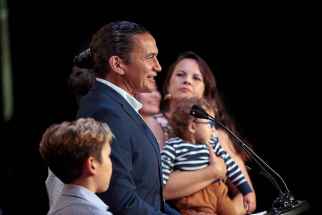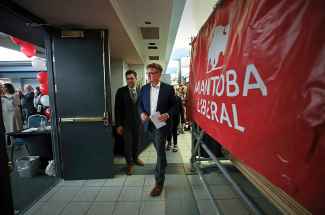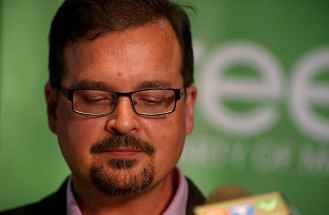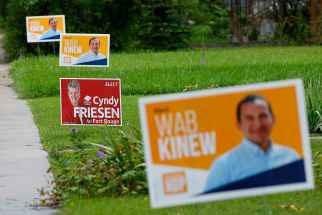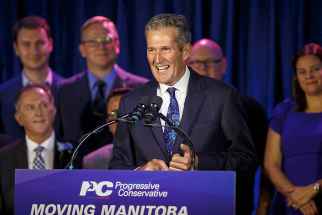Pallister’s victory an ‘I told you so’
Read this article for free:
or
Already have an account? Log in here »
To continue reading, please subscribe:
Monthly Digital Subscription
$0 for the first 4 weeks*
- Enjoy unlimited reading on winnipegfreepress.com
- Read the E-Edition, our digital replica newspaper
- Access News Break, our award-winning app
- Play interactive puzzles
*No charge for 4 weeks then price increases to the regular rate of $19.00 plus GST every four weeks. Offer available to new and qualified returning subscribers only. Cancel any time.
Monthly Digital Subscription
$4.75/week*
- Enjoy unlimited reading on winnipegfreepress.com
- Read the E-Edition, our digital replica newspaper
- Access News Break, our award-winning app
- Play interactive puzzles
*Billed as $19 plus GST every four weeks. Cancel any time.
To continue reading, please subscribe:
Add Free Press access to your Brandon Sun subscription for only an additional
$1 for the first 4 weeks*
*Your next subscription payment will increase by $1.00 and you will be charged $16.99 plus GST for four weeks. After four weeks, your payment will increase to $23.99 plus GST every four weeks.
Read unlimited articles for free today:
or
Already have an account? Log in here »
Hey there, time traveller!
This article was published 11/09/2019 (2283 days ago), so information in it may no longer be current.
He didn’t actually say it, but as he looked out over the jubilant crowd of election night supporters packed into a Polo Park hotel ballroom, you could easily imagine what Progressive Conservative Leader Brian Pallister would have liked to have said.
“I told you so.”
This was the election that almost no one — both inside and outside of his Progressive Conservative government — thought was a good idea. In almost all respects, there were many more reasons for not holding an election now than there ever were in favour of a launching a re-election bid.
The Tories had only been in office for three years and were very much a work in progress. Their controversial reorganization of Winnipeg hospitals is really only half done. Nearly 100,000 civil servants are currently without a contract, or soon will be without one. Infrastructure funding has been cut in half. Funding increases for health care and education has been meagre, at best.

Pallister had fought openly with Mayor Brian Bowman, the federal Liberal government and powerful opinion leaders from within his own party. It is not an exaggeration to say that over his first three years as premier, to know Pallister was to fight with him.
And yet, Pallister was supremely confident that this was the right time to go back to voters and seek a second majority mandate. He turned aside all protestations and repeatedly told his caucus and staff that he didn’t actually care if they got re-elected; he only cared about doing the right thing for the province.
It did not take long for Pallister’s great gambit to pay off. Within one hour of the polls closing, it was pretty clear the Tory majority mandate was assured, although they did suffer some losses. Still, Pallister was a man brimming with the satisfaction that comes with the knowledge that a win is still a win, and a majority is still a majority.
In what is expected to be the last election that he will fight as leader of the PC party, Pallister has the comfort of knowing that he was right, and all of the naysayers were wrong.
In what is expected to be the last election that he will fight as leader of the PC party, Pallister has the comfort of knowing that he was right, and all of the naysayers were wrong. However, as is the case in almost every election, the winners needed some focused help from the parties that did not win. This election was no different.
Voters are still very confident that the NDP are not a serious option to govern. If there was a clear disadvantage for the New Democrats in an early election call, it is the fact that it puts Tuesday’s election too close to the debacle in 2016. When you lose an election after 17 years in power, voters expect you to spend a bit of time in the penalty box; voters in this election clearly think the NDP needs a bit more time in the sin bin.
As for the Liberals and Greens, spirited and at-times thought-provoking campaigns simply failed to capture the imagination of voters or draw any support from the governing Tories.
However, the biggest reason why Pallister was returned to power with a smaller but still comfortable majority is that those Manitobans who were most aggrieved about the style and direction of his government largely stayed home.
It became clear very early on that this campaign was going to serve as a litmus test of the political influence wielded by several significant constituencies within the Manitoba electorate: public sector unions and the provincial civil servants they represent; nurses and teachers; municipal governments and school divisions; the province’s construction and related industries.
With his ‘my-way-or-the-highway’ approach to governing, each of these groups had more than enough motivation to rise up and smite the Pallister government for its tough-love posture over its first three years in office. It simply didn’t happen.
And now, Pallister can move forward with his agenda with the knowledge that he need not fear any of these groups. That will no doubt be a liberating experience for a leader who would rather work in isolation than collaborate with any special interest, and that includes the special interests in his own party.
The biggest reason why Pallister was returned to power with a smaller but still comfortable majority is that those Manitobans who were most aggrieved about the style and direction of his government largely stayed home.
Even with fewer seats on the government side of the legislature, Pallister is in a stronger position now than he was in 2016. He has vanquished more of his enemies and quieted more of the doubters. His mandate is, in many ways, far stronger and more clear than it was after the last election. What he chooses to do with that mandate is anyone’s guess.
While Pallister can celebrate his victory over the critics and doubters, NDP Leader Wab Kinew can celebrate his own accomplishment. With a modest increase in the size of his caucus, he satisfied the bare minimum of progress needed to justify his continued leadership of the party. Whether he chooses to stay on is another matter altogether.
Kinew took an awful beating in the campaign, with the Tories feasting on a litany of personal baggage he collected years before entering politics. This baggage, which includes allegations of domestic violence, did not serve as a drag on the NDP campaign or on Kinew personally. He finished the campaign with a higher overall net popularity rating than Pallister. But it must have taken a toll.
At the very least, Kinew is facing years of internal spadework to galvanize his hold on the leadership. For Pallister, a win is a win. But for Kinew, it will be some time before he knows whether his progress is enough to give him another shot at leading his party into an election.
dan.lett@freepress.mb.ca

Born and raised in and around Toronto, Dan Lett came to Winnipeg in 1986, less than a year out of journalism school with a lifelong dream to be a newspaper reporter.
Our newsroom depends on a growing audience of readers to power our journalism. If you are not a paid reader, please consider becoming a subscriber.
Our newsroom depends on its audience of readers to power our journalism. Thank you for your support.


